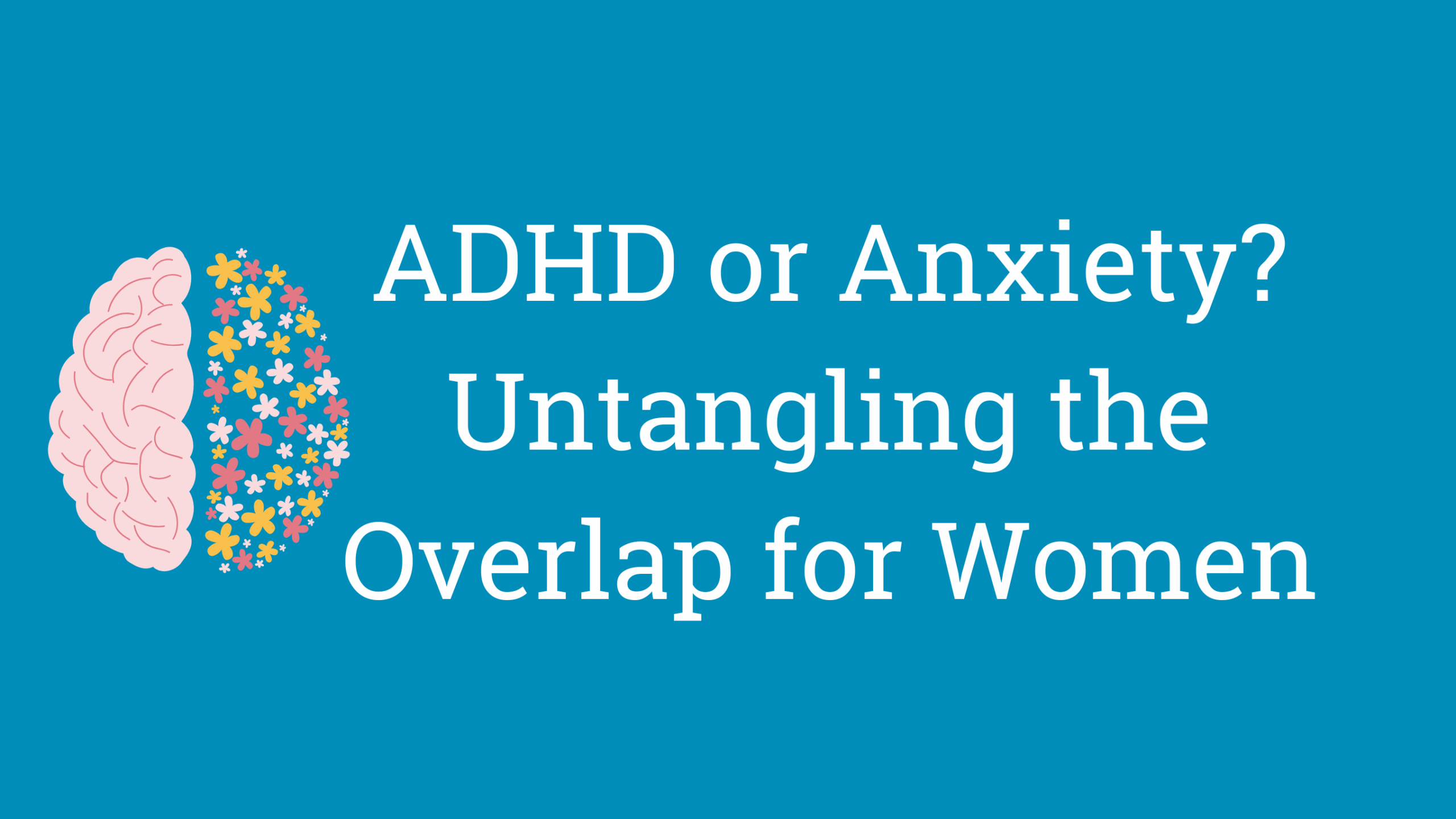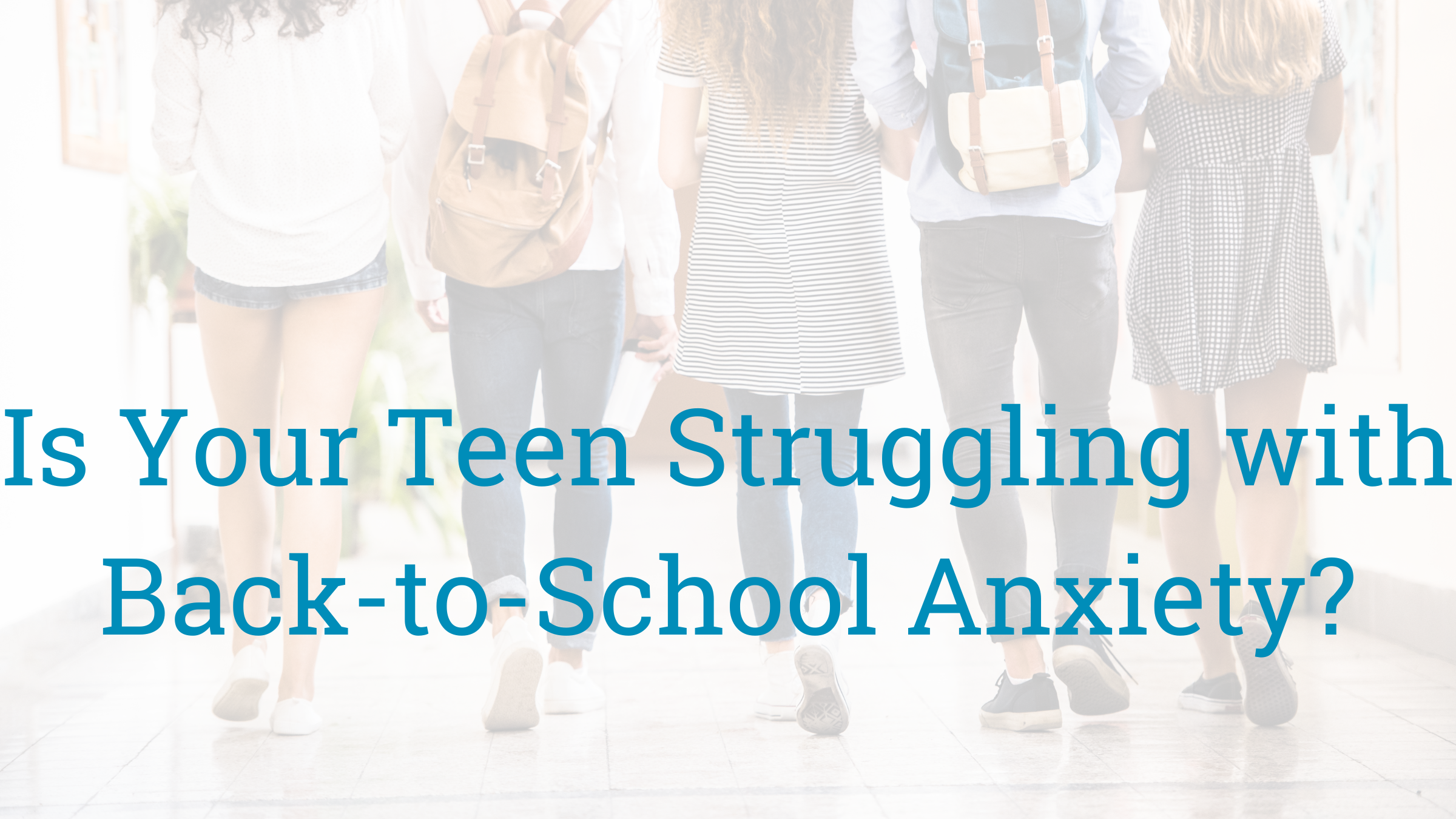
ADHD or Anxiety? Untangling the Overlap for Women
Can’t remember why you walked into the room—again? Feel like your mind’s always in overdrive, yet somehow never quite lands on what it’s supposed to? If you’re a woman juggling work, family, and expectations, you may have started to wonder: Is this anxiety? ADHD? Both? And why does it feel like nobody else is struggling quite this much?
You’re not imagining things—and you’re not alone. Many women, especially in mid-life, begin to notice difficulties with focus, forgetfulness, restlessness, or an undercurrent of worry that just won’t quit. Often, these symptoms overlap between ADHD and anxiety, and it’s easy to feel unsure of what’s really going on.
In this article, we’ll explore how these two conditions can mimic, mask, or intensify each other—especially in women. More importantly, we’ll talk about how to find clarity, and why there’s every reason to be hopeful.
Why It’s So Hard to Tell the Difference
ADHD and anxiety are distinct, but they share a lot of surface symptoms: distractibility, racing thoughts, trouble finishing tasks, irritability, sleep issues. It’s not uncommon for someone to walk into a mental health evaluation, certain they have one, only to find they actually have both—or that their struggles were misattributed all along.
One key difference lies in what’s driving the distraction. Anxiety tends to fill your mind with worry: “What if I said the wrong thing? Did I forget to follow up? What if I fail?” With ADHD, your mind may drift because it’s simply hard to stay engaged or organized—even if nothing is stressing you out in the moment.
Both can be frustrating, exhausting, and isolating. And unfortunately, women are more likely to be misdiagnosed or overlooked altogether, especially if their symptoms don’t fit the “typical” (often male) presentation of ADHD.
What ADHD Often Looks Like in Women
Women with ADHD often fly under the radar. Instead of hyperactivity, they might experience:
- Mental clutter: A brain that never seems to slow down, bouncing from one thought to the next.
- Forgetfulness: Missed appointments, lost items, conversations that drift before they’re done.
- Time blindness: Struggling to estimate how long things will take—or remember how long you’ve already been doing something.
- Emotional intensity: Feeling things deeply, and sometimes reacting quickly, even when you wish you wouldn’t.
- Chronic self-doubt: The sense that you’re always a step behind, no matter how hard you try.
Many women with ADHD become experts at compensating. They build elaborate systems, checklists, or routines to hold it all together. From the outside, it might look like they have it all under control. On the inside, it feels like they’re barely holding on.
How Anxiety Shows Up Differently in Women
While anxiety is more widely recognized, it’s not always understood well—especially when it shows up in high-achieving women who appear “fine.” Anxiety might include:
- Constant worry and second-guessing.
- Tension and restlessness that you carry in your body, even when nothing seems “wrong.”
- Perfectionism that isn’t about excellence—it’s about trying to prevent anything bad from happening.
- Irritability, exhaustion, or guilt—often from juggling too many roles or trying to meet impossible expectations.
In many women, anxiety becomes a quiet, internal pressure—rarely visible to others, but always humming in the background.
When You Have Both
ADHD and anxiety often travel together. Sometimes, anxiety develops as a response to undiagnosed ADHD. For example, if you’ve spent years missing deadlines, forgetting things, or feeling scattered, it makes sense that you’d start to worry constantly. You may have learned to expect negative feedback or disappointment—and now live in fear of the next mistake.
On the other hand, chronic anxiety can make it hard to concentrate, leading to ADHD-like symptoms. You might re-read the same email several times because your mind keeps jumping to something else. Over time, it becomes hard to tell what’s driving what.
Understanding that these conditions can co-exist—and influence each other—is a crucial part of building a treatment plan that works.
How to Move Toward Clarity
Sorting this out isn’t something you need to do on your own. A thoughtful, comprehensive evaluation with a qualified mental health professional can help you understand what’s underneath the symptoms you’re experiencing. This isn’t about putting you in a box or assigning a label—it’s about gaining insight into the patterns that have shaped your day-to-day life, so that you can make decisions with more clarity and compassion.
A good evaluation includes more than just a questionnaire. It should consider your life story, your strengths, your challenges, and how your symptoms have changed over time. It’s a conversation—not a checklist—and one that can open the door to real relief.
Treatment Can Be Life-Changing
Whether you’re dealing with ADHD, anxiety, or both, treatment can make a meaningful difference. That might include:
- Therapy, which can help you learn skills to manage thoughts, reduce overwhelm, and respond differently to stress.
- Lifestyle changes like improving sleep, building structured routines, and using technology to stay organized.
- Medication in some cases, if appropriate, to support focus or reduce chronic anxiety.
- Education and support, so you can better understand how your brain works—and stop blaming yourself.
Treament isn’t about “fixing” you. It’s about giving you tools to work with your brain instead of fighting it. Many women report a profound sense of relief when they realize they’re not lazy, flaky, or “too sensitive”—they just have a brain that’s wired differently.
You’re Not Broken—and You’re Not Alone
If you’ve spent years trying to figure out why everything feels harder than it should, wondering why you can’t just “get it together” like everyone else seems to—please know this: it’s not a character flaw. And you’re not the only one.
There are real explanations. And more importantly, there is real help.
The path forward starts with understanding. From there, you can build a plan that supports you—your brain, your life, and your goals. Whether that means learning new skills, setting better boundaries, or simply being kinder to yourself on tough days, the result is the same: more calm, more clarity, more hope.
Whatever it is you’re facing, you don’t have to figure it all out on your own. There are people who understand—and there are steps you can take today.
We’re here when you need us. For questions, click here to get started.
Learn More
Managing Back-to-School Anxiety in Teens
As the new school year begins, many teens experience a mix of excitement and anxiety. For some, the prospect of returning to school can be overwhelming and lead to heightened stress and anxiety.
Understanding the sources of this anxiety and implementing strategies to manage it can help teens navigate the school year with confidence and resilience.
Here’s what you need to know.
Understanding the Sources of Anxiety
Back-to-school anxiety in teens can stem from various factors, including:
- Academic Pressure: The fear of not meeting academic expectations can be a significant source of stress. Teens may worry about grades, exams, and the ability to keep up with coursework.
- Social Concerns: Friendships and peer relationships are crucial during adolescence. Worries about fitting in, making new friends, or dealing with bullying can contribute to anxiety.
- Changes in Routine: The shift from a relaxed summer schedule to a structured school routine can be jarring. Adjusting to early mornings, homework, and extracurricular activities can be challenging.
- Uncertainty and Change: Starting a new school, entering a different grade, or having new teachers and classmates can create feelings of uncertainty and fear of the unknown.
Signs Your Teen is Struggling with Anxiety
It’s important to recognize the signs that your teen may be struggling with back-to-school anxiety.
These can include:
- Physical Symptoms: Complaints of headaches, stomachaches, or fatigue without a clear medical cause may indicate anxiety. You can read more about some of the lesser-known symptoms of anxiety and depression here.
- Changes in Behavior: Your teen may become withdrawn, irritable, or have difficulty concentrating. They might also avoid school-related activities or express reluctance to attend school.
- Sleep Disturbances: Difficulty falling asleep, staying asleep, or waking up feeling unrested can be linked to anxiety. Learn how lighting can impact sleep in Monica Clark’s post here.
- Appetite Changes: Anxiety can lead to changes in eating habits, such as loss of appetite or overeating.
If you notice these signs, it’s important to address the issue and provide support. Early intervention can prevent anxiety from escalating and impacting your teen’s overall well-being.
Strategies to Manage Back-to-School Anxiety
There are several effective strategies you can use to help your teen manage back-to-school anxiety:
- Open Communication: Encourage your teen to talk about their worries and fears. Listen without judgment and validate their feelings. Knowing they have a safe space to express their concerns can be reassuring.
- Problem-Solving Together: Work with your teen to identify specific stressors and brainstorm solutions together. Whether it’s time management, making new friends, or handling difficult subjects, helping them develop a plan can reduce anxiety.
- Practice Relaxation Techniques: Teach your teen relaxation techniques such as deep breathing, mindfulness, or progressive muscle relaxation. These can be useful tools for managing anxiety in the moment.
- Establish a Routine: Help your teen establish a consistent daily routine that includes time for homework, relaxation, and social activities. A predictable schedule can reduce the stress of uncertainty.
- Encourage Social Connections: Encourage your teen to maintain and build social connections. Whether through extracurricular activities, clubs, or simply spending time with friends, strong social ties can provide emotional support.
When to Seek Professional Help
While many teens experience some level of anxiety when returning to school, severe or persistent anxiety may require professional intervention. If your teen’s anxiety is interfering with their daily life, causing significant distress, or if you notice signs of depression, it may be time to seek help from a mental health professional.
At Next Step 2 Mental Health, we offer specialized support for teens dealing with anxiety and other mental health challenges. Our team of professionals can work with your teen to develop coping strategies and provide the tools they need to manage anxiety effectively.
Here for You
Back-to-school anxiety is a common experience for many teens, but with the right support and strategies, it can be managed effectively. By understanding the sources of anxiety, recognizing the signs, and implementing practical coping techniques, you can help your teen navigate the school year with confidence.
If your teen’s anxiety persists or becomes overwhelming, don’t hesitate to seek professional help. With the right care, your teen can thrive both academically and emotionally. Click here to schedule an appointment with us.
Learn More

How to Tell If You Have a Social Anxiety Disorder
It’s normal to experience occasional nervousness in social situations. For example, you might feel butterflies if you’re going on a first date, or if you have to give an important presentation at work. However, occasional nervousness isn’t the same thing as social anxiety disorder. With social anxiety disorder, everyday social situations can create stress and anxiety that disrupts your life.
The good news is that social anxiety disorder (sometimes called social phobia) can be treated, but the first step is to get a proper diagnosis.
So how do you know if you have social phobia? We’ve got the answers here.
Symptoms of Social Anxiety Disorder
All of us experience uncomfortable emotions to some degree on a daily basis. This can include:
- Unease
- Apprehension
- Worry
- Nervousness
With periodic stressors, the body only has episodic reaction to the stressors. It’s not on-going. For instance, after your big presentation at work, you no longer feel stressed or uneasy. The uncomfortable feelings end when the periodic stressor stops. When anxiety symptoms develop into ongoing states of distress, it can lead to a diagnosis. With social anxiety disorder, you might feel these uncomfortable emotions just thinking about social situations. The on-going stress and anxiety can disrupt your life.
Signs and symptoms of social phobia include emotional, physical, and avoidance symptoms.

Emotional symptoms
Emotional symptoms include:
- Fear of social situations (fear of being judged)
- Anxiety about embarrassing yourself
- Fear of talking (or interacting) with strangers
- Replaying social interactions over and over in your head
- Feeling anxiety in anticipation of social interactions
- Fearing future events
Physical symptoms
Physical symptoms of social anxiety include:
- Blushing
- Flushed face or neck
- Intense sweating
- Shaky voice when speaking
- Upset stomach
- Rapid heartbeat
- Dizziness
Avoidance symptoms
Social phobia can impact the quality of your life, especially if you avoid activities or events that trigger anxiety. Avoidance symptoms include:
- Avoiding activities that require interaction with others (such as going to the grocery store, speaking to a waitress, etc.)
- Cancelling events with friends or family
- Avoiding any situation in which you might be the center of attention (public speaking, giving a speech, etc.)
Can children experience social anxiety? Yes. Children might refuse to speak, hide behind parents, and have a temper tantrum.
Treating Social Anxiety Disorder
Left untreated, social phobia can lead to low self-esteem, poor social skills, and difficulty maintaining relationships. The good news is that social anxiety disorder can be treated. Like all anxiety disorders, individuals with social phobia can benefit from mental health care. Common treatments include:
- Psychotherapy, including cognitive behavioral therapy (CBT)
- Medication (You can learn about medication management here.)
You can also reduce stress and anxiety by making time for activities you do enjoy, keeping a journal, and regularly practicing stress management techniques. According to the Anxiety and Depression Association of America, exercise (including gentle walking) can help boost your mood and reduce stress. [1]
Can a Pandemic Trigger Social Anxiety?
Pandemics can be stressful on individuals and entire families. Over the past few months, we’ve learned about a new disease — and a whole host of new social conventions. We’ve learned about social distancing, isolation, and how often (and what) items needs to be disinfected. According to the Centers for Disease Control and Prevention (CDC), stress, depression, and anxiety are increasing. [2]
Many individuals find that going into public right now can be scary… but can a pandemic trigger social anxiety?
To find out, we asked Dr. Brian Briscoe.
Let’s start with a correct definition of social anxiety. DSM V defines social anxiety as a “A persistent fear of one or more social or performance situations in which the person is exposed to unfamiliar people or to possible scrutiny by others…that is persistent, typically lasting 6 or more months.”
I do not have evidence that social anxiety will necessarily increase in post-pandemic times, but I do suspect that we may see an increase in overall rates of anxiety disorders in general.
Why?
Based on a study recently published in JAMA, we know that U.S. adults are experiencing a significantly higher degree of psychological distress during the Covid public health crisis. [3]
It is quite likely that higher rates of psychological distress will trigger existing pre-existing mental illness within vulnerable persons, and may also lead to the development of new mental illness, which include many anxiety disorders such as panic disorder, agorophobia, and PTSD – to name a few.
In my clinical practice, I have personally witnessed the stress/distress of Covid-19 trigger worsening symptoms in persons who struggle with a numeber of anxiety disorders such as Generalized Anxiety Disorder, PTSD, and Panic Disorder.
The good news is that we have treatments for these situations.
How Do You Tell the Difference Between Social Anxiety and Generalized Anxiety?
If you’re struggling with ongoing states of distress and feelings of anxiety, how do you know if you’re dealing with social anxiety or generalized anxiety?
Dr. Briscoe explains the difference:
Persons who struggle with generalized anxiety disorder tend to struggle with a broad variety of worries. They might:
- Have trouble turning their mind off
- Worry about lots of things
- Sweat the small stuff
- Worry about school, bills, finances, relationships, lots of things.
The worry may sometimes cause restlessness, fatigue, difficulty concentrating, irritability, or trouble sleeping.
Persons who struggle with social anxiety (a.k.a. social phobia), on the other hand, tend to experience a high degree of anxiety primarily in social settings, or in situations in which they fear they will be scrutinized or ‘judged’ by others.
Some people who struggle with social anxiety also struggle with generalized anxiety and vice versa, but not always.
Explore Your Next Steps
At NextStep 2 Mental Health, we provide comprehensive and compassionate anxiety treatment. Whether you’ve been struggling with generalized anxiety or social anxiety disorder, we can help you feel better. Give us a call at our Louisville, Kentucky office at 502-339-2442, or send us a message to request more information.
You can also request an appointment with our convenient scheduling tool here.
About Dr. Briscoe
 Dr. Brian Briscoe is a board-certified psychiatrist and the medical director of adult programs. Dr. Briscoe was voted a “Top Doctor” by Louisville Magazine. You can make an appointment with Dr. Briscoe here .
Dr. Brian Briscoe is a board-certified psychiatrist and the medical director of adult programs. Dr. Briscoe was voted a “Top Doctor” by Louisville Magazine. You can make an appointment with Dr. Briscoe here .
References:
- https://adaa.org/living-with-anxiety/managing-anxiety/exercise-stress-and-anxiety
- https://www.cdc.gov/coronavirus/2019-ncov/daily-life-coping/managing-stress-anxiety.html
- Emma E. McGinty, Rachel Presskreischer, Hahrie Han, Colleen L. Barry. Psychological Distress and Loneliness Reported by US Adults in 2018 and April 2020. JAMA, 2020; DOI: 10.1001/jama.2020.9740
